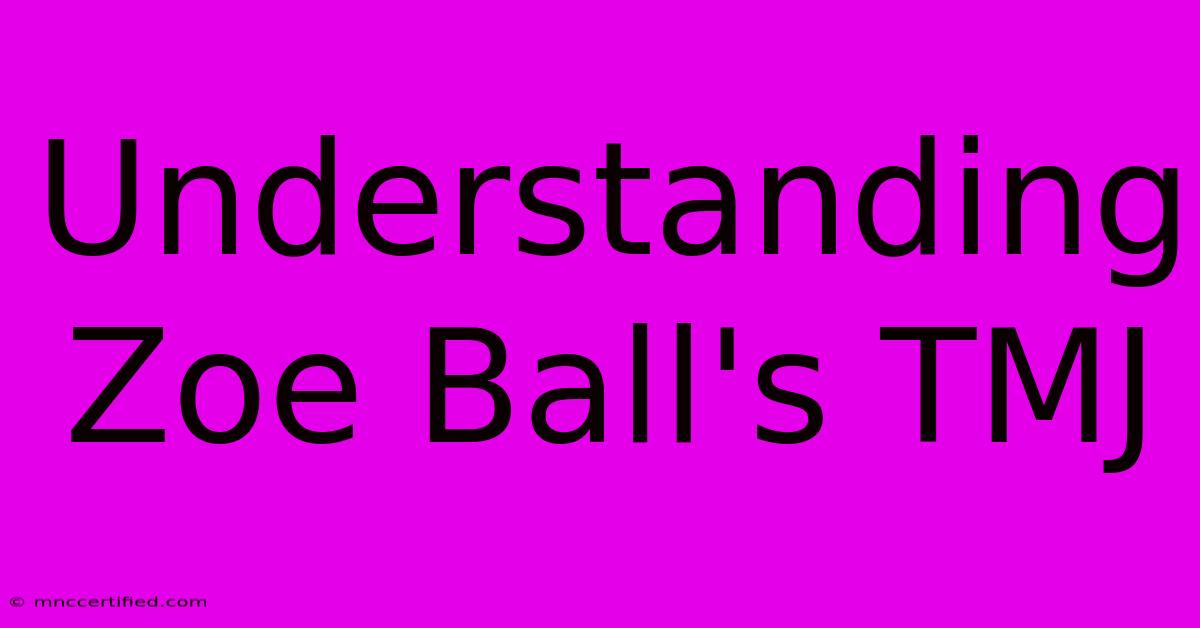Understanding Zoe Ball's TMJ

Table of Contents
Understanding Zoe Ball's TMJ: A Look at the Broadcaster's Battle and the Condition Itself
Zoe Ball, the beloved British broadcaster, has been open about her struggles with temporomandibular joint (TMJ) disorder, or TMJD. This openness has helped raise awareness of this often misunderstood condition. This article will delve into Zoe Ball's experience, exploring the symptoms she's described and providing a comprehensive overview of TMJ disorder itself, including its causes, symptoms, and treatment options.
Zoe Ball and Her TMJ Journey: A Public Perspective
While Zoe Ball hasn't detailed every aspect of her TMJ journey publicly, her candid discussions have highlighted the significant impact this condition can have on daily life. She has spoken about experiencing severe pain, impacting her ability to speak and eat comfortably. This underscores the debilitating nature of TMJD, which can affect not just physical well-being, but also mental health and professional life. Her experience serves as a powerful example of the challenges faced by many individuals suffering from this disorder. Understanding her story helps normalize the conversation around TMJ and encourages others to seek help.
What is Temporomandibular Joint (TMJ) Disorder?
TMJ disorder, or TMJD, refers to a group of conditions affecting the temporomandibular joint (TMJ), the joint connecting your jaw to your skull. This joint allows you to open and close your mouth, chew, speak, and yawn. When this joint becomes inflamed or misaligned, it can lead to a range of painful and debilitating symptoms.
Common Symptoms of TMJ Disorder:
The symptoms of TMJD can vary widely, but some common signs include:
- Jaw Pain: This is often the most prominent symptom, ranging from mild discomfort to severe, debilitating pain.
- Headaches: TMJD can trigger headaches, particularly those affecting the temples and forehead.
- Earaches: Pain in the ear, often mistaken for an ear infection, can be a symptom of TMJD.
- Neck and Shoulder Pain: Muscle tension and inflammation in the jaw can radiate to the neck and shoulders.
- Clicking or Popping in the Jaw: This sound occurs when the joint is misaligned or inflamed.
- Limited Jaw Movement: Difficulty opening or closing your mouth fully.
- Facial Pain: Pain can be felt in various parts of the face, including the cheeks and temples.
- Difficulty Chewing: Chewing can become painful and difficult, leading to dietary changes.
Causes of TMJ Disorder:
The exact cause of TMJD is often unclear, and it can stem from a combination of factors. Some potential causes include:
- Injury to the Jaw: Trauma to the jaw, such as a blow to the face, can contribute to TMJD.
- Teeth Grinding (Bruxism): Habitual teeth grinding, often done unconsciously, places excessive stress on the TMJ.
- Stress and Anxiety: Stress can exacerbate muscle tension and inflammation, leading to TMJD symptoms.
- Arthritis: Degenerative joint conditions like osteoarthritis can affect the TMJ.
- Poor Posture: Maintaining poor posture can strain the jaw and surrounding muscles.
Treatment Options for TMJ Disorder:
Treatment for TMJD varies depending on the severity of the symptoms and their underlying cause. Options may include:
- Over-the-counter pain relievers: Ibuprofen or naproxen can help manage pain and inflammation.
- Muscle relaxants: Prescription muscle relaxants may be used to reduce muscle spasms.
- Physical Therapy: Exercises and stretches can help strengthen jaw muscles and improve joint mobility.
- Splints or Mouthguards: These devices can help realign the jaw and protect the teeth from grinding.
- Injections: Corticosteroid injections can reduce inflammation.
- Surgery: Surgery is generally considered a last resort and only in severe cases.
Seeking Help and Managing TMJ Disorder:
If you suspect you have TMJ disorder, it's crucial to consult a dentist or doctor specializing in TMJ conditions. Early diagnosis and intervention can significantly improve outcomes. Lifestyle changes, such as stress management techniques and maintaining good posture, can also help manage symptoms. Zoe Ball's public discussions highlight the importance of seeking professional help and advocating for your own health needs. Remember, you are not alone. Many individuals experience TMJD, and effective treatment options are available.
Keywords: Zoe Ball, TMJ, Temporomandibular Joint Disorder, TMJD, jaw pain, headache, earache, neck pain, shoulder pain, clicking jaw, jaw movement, facial pain, teeth grinding, bruxism, stress, anxiety, arthritis, treatment, physical therapy, splint, mouthguard, surgery.
Note: This information is for educational purposes only and should not be considered medical advice. Always consult with a healthcare professional for diagnosis and treatment of any medical condition.

Thank you for visiting our website wich cover about Understanding Zoe Ball's TMJ. We hope the information provided has been useful to you. Feel free to contact us if you have any questions or need further assistance. See you next time and dont miss to bookmark.
Featured Posts
-
Misfits Boxing 19 Results Gib Vs Slim
Nov 29, 2024
-
Raiders Chiefs Game Viewing Guide
Nov 29, 2024
-
Live Tottenham Vs Roma Tv And Team News
Nov 29, 2024
-
Dental Insurance Falls Church
Nov 29, 2024
-
Non Owner Sr22 Insurance Iowa
Nov 29, 2024